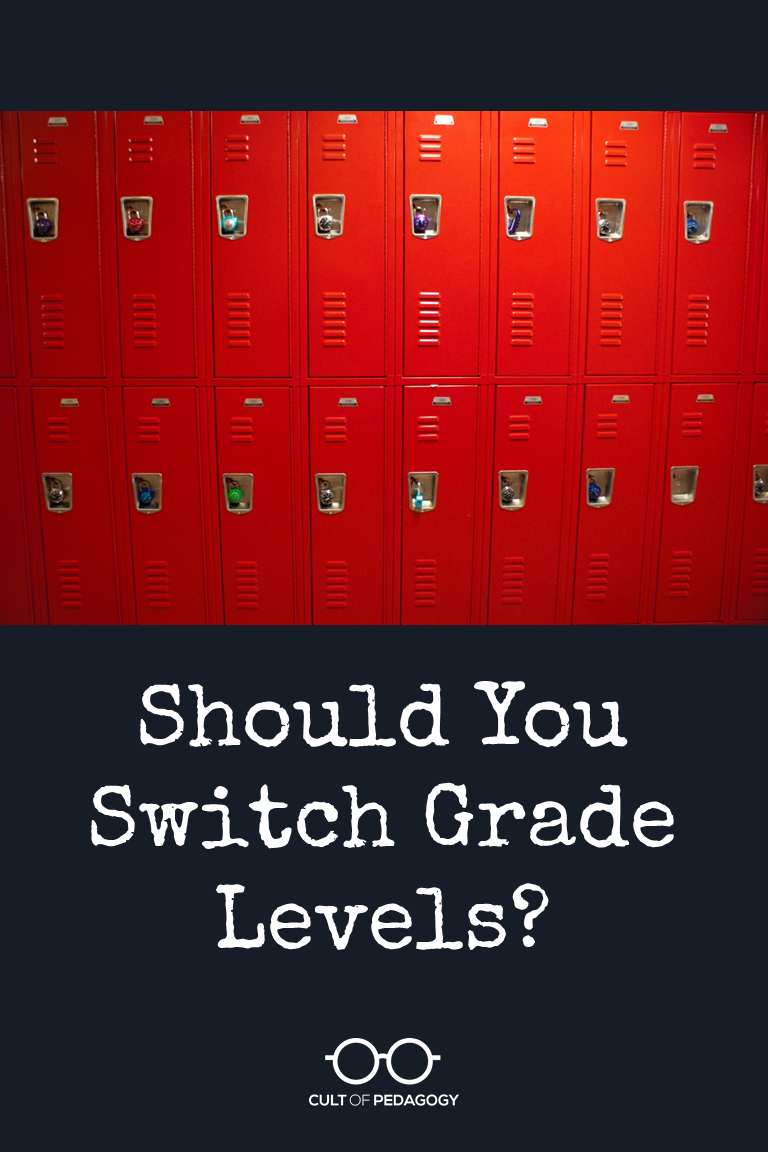
About two weeks ago, I got this question on my Facebook page:
Hi everyone. Has anybody switched from secondary teaching (upper years) to primary teaching? Pros and cons?
Since I have not had this experience myself, I thought I would throw it out to my readers and see what you can do to help this teacher make her decision. In the past, you have been a fabulous resource for helping parents decide whether to have their child skip kindergarten or have their child take on extra math practice, so I’m hoping you’ll come through again here.
I did my own research and found some excellent resources that could also help this reader and anyone else trying to make the decision to switch or not to switch grade levels.
5 Tips for Changing Grade Levels
Autumn Bell, Teaching Channel
The Transition from Secondary to Primary
Alison Brady, Protocol Education
Have You Been Teaching the Same Grade Too Long?
Peter DeWitt, Education Week
Why I Moved from Secondary to Primary and Love It
Mei Lim, Schools Week
Making the Switch: How I Moved from Sixth Form to Primary Teaching
Richard Palmer, The Guardian
So what do you think? Have you made a significant switch from one age group to another? What were the pros and cons of each age group? What advice would you give to someone thinking about making the switch? Please add your thoughts in the comments below, and thank you!! ♥
Join my mailing list and get weekly tips, tools, and inspiration — in quick, bite-sized packages — all geared toward making your teaching more effective and fun. To thank you, I’ll send you a free copy of my e-booklet, 20 Ways to Cut Your Grading Time in Half. I look forward to getting to know you better!





In my experience (ranging from 4th grade to HS), the biggest change going from secondary to elementary is the students. They are a lot less independent and need more guidance not only academically, but socially/emotionally as well. I have really had to constantly self-monitor and adjust my approach to them. That said, I absolutely love where I am now and would have a hard time going back up. I never dreamed I’d want to work with anyone but 8th graders, but 5th graders are a perfect blend of what I love about elementary and middle school aged students. It has been a good change for me, but it wasn’t a huge leap. It might be a different story had I gone to a primary classroom, but that’s me.
Thanks for sharing your experience, Kellie. It sounds like the transition expanded your skill set as a teacher.
As I was looking into Ed leadership, my principal suggested I try an intermediate grade. After 20 extremely happy years in kindergarten, I was certain it was the best possible place for me. After some convincing I hesitantly agreed to move to third grade the next year. I absolutely loved it. I learned two things. I was ready for a new challenge and I reinvented myself as an educator. Secondly, if you love kids, you love all kids. In the end, I think I loved teaching third even more! Change is good, go for it.
Cyndi, I’m so glad you had a good experience. Sometimes we get so comfortable in one space, the thought of any kind of change is scary, but it can be so liberating once you’ve taken the leap. Thanks for sharing your story!
I went from middle (7th) to high (9/10) and it was definitely an adjustment, but it was worth it. I’ve taught everything from 5th to 12th, and changing grade levels is a great way to learn more about your own teaching style (and self) as well as figuring out the best fit for you as a teacher. Through teaching a wide range of grades, I now know what I am best at, what I enjoy most, and that helps me be a better teacher and enjoy what I do more. I have realized that my favorite/best grades are 7th and 9th. I know enough about myself that I wouldn’t even apply for some grade levels (8th, 10th, or primary). Fit is probably the most important thing for a successful teacher, so playing around with grade levels are essential!
You make a good point, Meredith. Unless you try different grades, you may never know if another age group might be a better fit for you.
Don’t forget to consider the change in your working environment and work load, and how that may impact you. Does the school you’re considering group children into a straight grade or multi grade? Do you have a music and p.e. specialist to work with, or will you be expected to teach those content areas to your class? Will you be expected to rotate with teaching partners and get to focus on teaching a few content areas, or will you teach all content areas to your class of students?
When I moved from the middle grades down to kindergarten, it was the hardest switch I’ve ever made. I found going down in grades to be trickier than going up, but if you review their developmental stages, their need for scaffolding and support will be less of a surprise. Good luck, and have fun! Remember that the best age of students to teach is the one you’re teaching!
Christine, thank you for contributing these thoughtful questions; all of them are important considerations when switching roles. They would be helpful even when moving from one school to another in the same grade.
K: I made the mistake of showing a hand-washing video right before lunch. All 20 students lined up to wash their hands. I had to cut them off so we didn’t miss our time to eat.
1: They still need help tying shoes. Velcro, please!
2: Second grader quote: “Mr. Mitchell, the odd grades are new material. The even grades are review.” Guessing they repeated what they heard at home!
3: Extremely enthusiastic. Will do ANYTHING to avoid being stopped in the hall.
4: Old enough to work relatively independently. Young enough to have an innocent sense of humor.
5: Willing to have deep conversations. Willing to eat boogers.
6: Leaders at the elementary level, overwhelmed in middle school
7: Spent 14 years teaching this grade level. I was successful because I’m at the same emotional level as a 12-year-old!
8: They want to be high schoolers but can’t quite hack it yet.
9: Leaders in Junior High, my least favorite grade level to substitute teach when housed in a high school. Freshmen are big Kindergartners, loyal to their teachers, dependent upon routine and completely egocentric.
10: The youngest students to consistently express original opinions, not their family’s ideas about things.
11: Antsy. Ready to be seniors.
12: Responsible, hard-working, ready for life.
This cracked me up. All of it is so true!!
I went from teaching kindergarten to high school students. I was super excited for a change in the content, I wasn’t looking forward to dealing with teen issues. After the move I quickly realized kids are kids and you love them all no matter what the age!!
I bet a lot of teachers have had similar experiences. Thanks so much for sharing this.
I am dually certified in regular and special ed K-8 and have taught every grade on both side of the IEP. My favorites are 3rd, 7th and 8th- because so much change happens then- kids are leaping to new skills and senses of responsibility ( and there are far fewer visible body fluids)
and far more funny body fluid jokes. 3rd graders are transitioning from learning to read, to reading to learn and mostly taking such delight in it. 7/8th graders are testing boundaries, accepting consequences, demonstrating intuitive leaps in learning. Every grade has many, many more positives than negatives but if I never have to tie someone else’s shoes or hold a tissue saying “blow” again it will be a blessing!
I think it depends on the main subject area you’ll be teaching as well. I spent my first nine years teaching high school English. The last six were at the 12th grade level because I loved British Lit (I can totally geek out on Chaucer).
But I was drowning in AP essays every weekend. Once we switched to a new A/B block schedule, my workload doubled from 90 kids to 180. It was awful. I left not because of the kids, but because of the unsustainable work load.
Meanwhile, I had been helping out with 5th/6th graders at my church on Wednesday nights. Now that’s a super-fun age group!! So I suffered through my ninth year of high school AP English Lit and switched to teaching 6th grade Language Arts at another school in the same district.
I haven’t looked back. I love the age, I love teaching just Language Arts (I happen to be at a school where we teach specialized subjects, but I know people who teach other subjects as well, even for 6th grade). My knowledge of what kids need to be able to do by the time they reach reach high school English has made the curriculum part of my job a really cool challenge that I love working with. In fact, it lead me to create a whole website dedicated to lesson plans specifically for sixth grade Language Arts. I’m that passionate about it, and I never would have discovered this passion if I hadn’t made the change.
You go for it!
Laura, thanks for sharing your story here! As a former middle school language arts teacher, I can really relate to this!
What’s your website??
Hi, I am thinking of switching from 3rd to 6th. It is scary because I know 3rd grade content after teaching it for five years. However, I want a new experience and I feel six grade would be great. My hardest challenge would be lesson planning and learning new curriculum.
I am switching from 6th (ELA) to 3rd (all subjects)!
I am looking to possibly do this now. How did that switch from 6th (one subject) to 3rd (all subjects) go for you?
Hi Kiy!
I am wondering how did you like this transition?! Was it a lot more work? Any input would be greatly appreciated as I am about to do the same switch. 6th grade ELA to 3rd grade all subjects.
Thank you!!
Did you give your high school a notice or did you quit effective immediately?
I made the move from 5th grade to kindergarten. What a learning curve that first great was! I spent three years with kindergarten then decided it was time you return back to the older elementary kids. I’ve now taught K, 3rd, 4th, 5th, and 6th but I’m most at home with fifth grade. Now as I make the move to leadership I’m grateful I’ve had experience in the different grade bands. Change is good do my advice to this teacher is to go for it. Love it, or hate it, you’ll learn more about yourself and as was said in several comments, at the end of the day kids are kids.
Excuse my typos from my previous reply!
After 30 years in Elementary, I am excited about my upcoming middle school position. The feedback here has been very helpful and inspiring! Thank you! I agree that when you genuinely love and care about kids, it transcends the ages.
This is a long shot, but I am thinking about making the same transition. How did it go for you??
I would like to praise Laura’s comment. It really spoke to me, as I am currently teaching AP Literature and senior lit. I am drowning in the work load, and I may have an opportunity to teach at the 6th grade level. I find the idea both exhilarating and challenging; however, in reading the aforementioned comments, I am starting to feel that I can go back to 6th grade! Thanks for posting!
I thought teaching 9th grade was the best. Then I got 8th grade, and thought I’d died and gone to hell. I never wanted to go down in grades because of that experience. Then I got 11th grade, and decided THEY were the best. Now I have grades 6, 7, 9 and 10 (all in the same year!) and wouldn’t you know it? The 6th graders are my favorite. I’m older now, and this is a different group of kids. I think it depends on the kids you get, honestly. Sometimes you have chemistry with them, sometimes you don’t. But you won’t know unless you try it. Good luck!
Over my 11 years teaching, i have encountered K, 1, 2, 7/8, and 8/9. I found the biggest difference to be the mentality of my peers rather than the students. Students want your attention whether they are kindergarteners that are in your face asking or high school students that act as though they don’t care. They need your attention. I am actually struggling to determine which elementary grade is the best fit for me. There is a lot of training of behaviors at the beginning levels and it is expected by the upper elementary grade that those behaviors have been practiced and reinforced. That’s a lot to handle while teaching children to read in first grade. The students at the younger levels are so loving as a group while the middle school and early high school students are easier to talk with. They can be spoken to like an adult. There are pros and cons everywhere, but i agree that you wont know if you don’t try different levels. Good luck!
I am in the process of switching grade levels. I was a secondary teacher, stayed at home with my children for 10 years, and now I am back. Subbing gave me a different perspective of different ages and I completely fell in love with Kindergarten to 2nd grade. I find the students make the difference. High School students are in such a different place from when I started teaching 20 years ago. I honestly just did not enjoy their attitudes and respect (lack of that is). Primary grades are full of life, want to be included, and please their teachers. After raising three children, the devotion I have to the little ones is why I know I have made the right move.
I made the switch from high school to elementary about 7 years ago and I couldn’t be happier. I did enjoy high school, but after my daughter was born I took a couple years off. When I started to plan my return, I had a feeling that working with younger learners would be more intuitive for me, both academically and in my relationships with students. I thought working with adolescents was possibly a stretch for me (even though it was a stretch that I enjoyed), but maybe elementary would be a more natural fit. Since I was returning to teaching, I had some time to sub first, and I used that as an opportunity to work in many different grade levels. My hunch that this would be a good move turned out to be spot on. I’ve been teaching K-6 for the past 4 years and next year will go to 3rd. Love it. Good luck pondering this professional move. Trust your intuition!
And on a lighter note…
There is a litmus test for this particular quandary. Ask yourself one question;
What do I love most?
a) My students
b) My subject area
c) Myself
If you answer a) teach primary. If you answer b) teach secondary. If you answer c) teach at University.
Hi, Adam! I’m a Customer Experience Manager for Cult of Pedagogy…but I’m also a college teacher. I realize you began with “on a lighter note,” but I wanted to comment on your last point.
I recognize that I am a special case–I have an MA.Ed. with certification in ELA for grades 6-12. But with that master’s degree, I am currently an Adjunct Instructor of English and LOVE my job! I work incredibly hard to make my classes a learning experience for my students.
Just yesterday, a student told me she’s so glad she transferred this semester from another college so that I am her literature teacher. She admitted literature is not her favorite thing, but she appreciates the effort I put into the class and the fact that I’ve made it fun.
I’ve found I have a heart for helping students who are starting out on this monumental life-changing decision they’ve made to become college students. So, not every college teacher is simply into him/herself and delivering lectures for content’s sake. There are still a few of us focused on pedagogy, who love our students, and who try our hardest to create student-centered classrooms!
So what do you teach? I’d love to know more about the creation of this “litmus test”!!
Yeah, that “litmus test” doesn’t seem to hold true, at least in my experience. First of all, I went to a smaller college and my chemistry professors were absolutely in education for the students. Of course they loved their subject matter, but they cared about us and providing an excellent education for us. In addition, I am a high school teacher, and I can tell you that if you love your content like I do, but you don’t care about your students, you will fail at high school education. You will be teaching teenagers that don’t love your content. In fact, they will oftentimes hate your content and will fight you at every step of the way as you are teaching it. If you don’t develop a relationship with your high schoolers, you can’t teach them a thing because they won’t care. Finally, having been an uncertified elementary teacher, I can tell you it’s not all about the relationship with the kids. Of course that’s a big part, but if you aren’t cracking down and making those kids work on their reading and mathematics, you will fail to provide a quality education for those kids. So yeah, I’m definitely not a fan of your litmus test.
My experiences show this to be somewhat true. Most of my professors fall into this category three, easily.
I loved this. It makes things so simple and is so true. I’ve taught 1-8 for 20 years with the most recent being 1st. Over that time my answer has changed from a to b. Now I’m heading toward High School to teach my favorite subject: Math.
If you’re planning to try teaching in a different grade level, this quiz we created at Gwynedd Mercy University may help.
With a few questions based on your teaching preferences, your personal outcome reveals what kind of teacher you may be best suited to me. Try it here:
https://www.gmercyu.edu/academics/learn/what-kind-of-teacher-should-I-be
I have been teaching for 22 years now, ranging from grades 7-12 and as a tenured college professor of secondary education. I recently returned to a high school setting after teaching at the college level for the previous five years. I have supervised student teachers. And I am at a point where I have grown tired of high school kids and picking up adjunct college classes when asked. I am not sure if I am just burned out or if I need a major teaching change. I have taught 12th grade (and high school) for much too long I fear. I may have a chance to move to primary teaching 6th grade ELA. I am seriously considering it, but I really don’t know what to expect. I wonder if it will reignite my love for my profession, but I have no idea what challenges to expect from 6th graders.
Hello there! My name is Holly and I work for Cult of Pedagogy. It sounds like you’re in the midst of huge professional changes! We can’t really stand behind a definitive answer since we don’t know you personally, but we do know that certain people are simply “made” to teach certain grades.
Jenn’s advice is to observe, spend a day in a 6th-grade classroom (if there’s still time). Ask the teacher to see the kind of work they’ve done, ask behavior and classroom management questions, and try to get a feel for how this will be different than the work you’ve done so far. The younger the students, the more dependent they will be on you, so an important question to answer is why you didn’t enjoy teaching high school. Hope this helps and good luck!
Hi! I’m almost in the same boat. I’m certified 7-12 high school, but I’ve been teaching English at 3 colleges for the past 14 years! I recently went back and have my certification in library science. I was offered two jobs, one as a high school librarian and one as an elementary school librarian. I am so scared of the change but I think I’m going to the elementary. I was so burned out of college and teaching English. I think the little kids in a library setting will be fun. I hope!
The feedback here has been very helpful.
I’m debating a return to teaching but N.C. makes it difficult to switch grade levels. If I only held a BS degree in a subject area other than teaching, I could begin another grade level and work on my additional course work. Those who currently hold a teaching degree aren’t permitted to do that. My degree is in Secondary (9-12) English. After graduating, I took a position in social work as a contract Behavioral Interventionist within a school setting. I burned out quickly in that role and moved in sales and a product trainer. Since then, I’ve worked as sales support for 15 years. I’d like to go back to teaching but as an elementary teacher. N.C. requires a separate BS degree for that though and I can’t sell my spouse 2 years+ of living on one income, student loan debt, and for a lower paying position after graduation. Every time I step foot onto my daughters’ elementary school grounds, I feel at home. I’m just not sure how to overcome all these obstacles. How are so many who commented able to so easily switch across age groups?
Hey Amy! I’m not sure where many of these people are/were from, but in Texas there are multiple ways to get certified (college, alternative programs) and as soon as you are certified, you are eligible to take any tests that you sign up and pay for to be certified in that subject. For example, I majored in Social Studies Education (Secondary) but I took the Core Subjects (4th-8th) Exam after I got my Social Studies Certification so now I am also certified to teach 4th and 5th. Many schools will also hire future teachers who are currently enrolled in certain stages of alternative certification programs. I’m not sure what’s available to you in NC but good luck!
In Arizona we have multiple pathways as well. I am certified Elementary, but was able to take a few classes and will be able to take a Secondary contract using an Alternative Certificate for my first year. Arizona had to do this because of the severe teacher shortage. I guess NC must not need teachers as badly.
Better yet, teach your same kids the following year with looping! Better attendance, academic outcomes, behavior, teacher retention… the list goes on.
Hi there!
Been teaching grades 5-6 for 23 years at elementary schools.
Now thinking of moving to 7th grade at middle school. Our middle school is 7 and 8 only.
Tired of all the little rules in activities from K to 6.
What do you think?
Hi Sophie,
Sounds like you are ready for some kind of change. I taught 5th grade for 18 years and at one point, I imagined being there my whole career. I just loved everything about it! But when a 1st grade position opened up, I was intrigued. Early literacy had always been a passion, so before I made the commitment, I did my research. I spent a day observing a master 2nd grade teacher and talked to other primary teachers. They answered my questions, which helped me take the leap with confidence. That led to 14 years in 1st grade.
If you haven’t already, I’d reach out to some of the middle school teachers and just talk to them about what’s going on. Although physically observing a classroom isn’t likely an option right now, perhaps you can join in on an online lesson or virtual meeting. Also check out this post that Jenn wrote several years ago – it’s pretty enlightening. 8 Things I Know For Sure About (Most) Middle School Kids.<a
It’s funny, I thought I was crazy for having the idea to move from 11th/12th, down to 4th/5th. I’m entering my 17th year (8 in middle, 9 in high with the last few being AP US History, AP Seminar, and AP Research). I love the kids, and I do really well with the courses, but it isn’t a lot of fun, I imagine because we’re so focused on scoring well. I know elementary has its own challenges, as my wife is going into her 18th year doing Kinder and PK, but there does seem to be more enjoyable aspects to it and more ability to connect with all of the kids (versus my usual 180ish). I’ve reached out to friends who teach elementary to see what they have to say, but I love the idea of visiting an elementary class for a day to really see how it works day to day. Thankfully I know an elementary principal, so I’ll have to reach out.
There is some really great insight on this thread; thanks everyone!